|
|
|
Sort Order |
|
|
|
Items / Page
|
|
|
|
|
|
|
| Srl | Item |
| 1 |
ID:
149706
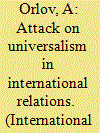

|
|
|
|
|
| Summary/Abstract |
THROUGHOUT THE HISTORY of human civilization, the system of international relations has been moving through radical changes toward complexity and perfection. Today, we have arrived at a unified and homogenous system of commonly accepted norms and rules of behavior approved and recognized by the absolute majority of states. This system emerged from fragments each belonging to its own specific historical stage of social development and related to political, philosophic, cultural, religious and other distinctive features of countries and regions.
|
|
|
|
|
|
|
|
|
|
|
|
|
|
|
|
| 2 |
ID:
140138
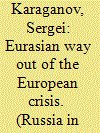

|
|
|
| 3 |
ID:
144992
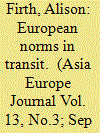

|
|
|
|
|
| Summary/Abstract |
Previous research has demonstrated that EU trade mark norms found their way into New Zealand law through the World Trade Organisation agreement on Trade-Related Aspects of Intellectual Property Rights (WTO TRIPS). This paper will give a brief résumé of that research and outline the current enquiry—whether these and related norms are likely to be re-transmitted, in identical or modified form. This could occur via the draft intellectual property chapter of the proposed Trans-Pacific Partnership (TPP) agreement. While this was under discussion, the EU and USA were negotiating a Trans-Atlantic Trade and Investment Partnership (TTIP) agreement. Although geographical indications (GIs, protected under trade mark law in the USA) have been a hot topic in TTIP negotiations, there is scant information on any possible chapter on GIs, trade marks and other forms of intellectual property in TTIP. However, US Trade Representative and TTIP negotiator Michael Froman has spoken admiringly of the intellectual property provisions in the draft TPP. If an intellectual property chapter were introduced into TTIP, it seems likely that TPP text would be adopted or adapted, bringing norms full circle back to the EU. In considering this possibility, it is suggested that the biological analogy of viral transfer of genetic code may be even more apt than that of transplants to illuminate the process of re-transmission of adopted or adapted legal norms through the medium of international treaties.
|
|
|
|
|
|
|
|
|
|
|
|
|
|
|
|
| 4 |
ID:
140023


|
|
|
|
|
| Summary/Abstract |
The forthcoming Asia Pacific Economic Cooperation (APEC) summit in the fourth quarter of 2015 in the Philippines might witness India gaining entry to the economic grouping. APEC is an international grouping of 21 countries including the United States and Japan, which promotes free trade among its members. With a new government in India, it was felt, that the Obama administration had an opportunity to revitalise its economic ties with India by the latter’s inclusion in the Asia-Pacific Economic Cooperation (APEC) forum. In January 2015 when President Obama visited Delhi, it was hinted that US would support India’s membership in APEC.3 The 13th meeting of RIC (Russia, India, and China) foreign ministers held in February 2015 also echoed similar views. External Affairs Minister Sushma Swaraj had added, “India’s participation in APEC has been welcomed by both China and Russia”.
|
|
|
|
|
|
|
|
|
|
|
|
|
|
|
|
| 5 |
ID:
159603


|
|
|
|
|
| Summary/Abstract |
When the Transatlantic Trade and Investment Partnership (TTIP) negotiations were underway, its politics were distinctively transnational. Numerous alliances between European and American industry associations advocated an ambitious agreement to mitigate the effects of conflicting rules. Some civic interest groups also closely cooperated to shape the agreement, while a broad, loose transatlantic coalition of civic interest groups opposed it. The extent of transnationalism in TTIP was greater than what had come before in the transatlantic relationship and what is evident in contemporaneous analogous trade negotiations. This article argues that while the salience of a trade negotiation affects whether societal actors mobilize, it is not sufficient to prompt transnational cooperation. Rather transnational cooperation stems primarily from what the actors are seeking to achieve and whether they have a motive and opportunity to work together. By clarifying the conditions under which transnational cooperation is more likely, this article informs the emerging literature on the new politics of trade. By making the case that the motives to mobilize and cooperate require distinct analysis, it contributes to the literature on transnationalism.
|
|
|
|
|
|
|
|
|
|
|
|
|
|
|
|
| 6 |
ID:
144835


|
|
|
|
|
| Summary/Abstract |
Events since I published my book Post-democracy in 2004 suggest that democracy continues to decline in effectiveness in those parts of the world where it has been most strongly established. The global financial crisis, the consequent euro crisis, the likely shape of a Transatlantic Trade and Investment Partnership (TTIP) and growing evidence of the political power of giant mass media corporations all suggest that the dominant forces in today's politics are not those of democratic will. Movements like Syriza in Greece possibly suggest a democratic reawakening, but that is too early to determine. Meanwhile, it is important also to be aware of democracy's limits, and to try to resolve the problem of post-democracy by extending its reach beyond its competence.
|
|
|
|
|
|
|
|
|
|
|
|
|
|
|
|
| 7 |
ID:
139953


|
|
|
|
|
| Summary/Abstract |
As summer slowly unfolded in Washington in 2015, the global trade bill was tenuously moving forward after surviving more than one near-death experience. It is a syndrome as well as a legislative event: No global trade liberalization agreement has advanced beyond the aspirational stage since the Uruguay Round was completed more than 20 years ago, and the United States has managed to finish only one substantial regional agreement, the North American Free Trade Agreement (NAFTA), since 1994. There is a simple explanation for this indecisiveness and inaction: Trade liberalization is hard to sell to a skeptical public bombarded with populist fear of competition from a succession of low-wage countries, and political leaders have consistently failed to muster the political will to push agreements to completion.
|
|
|
|
|
|
|
|
|
|
|
|
|
|
|
|
| 8 |
ID:
144947
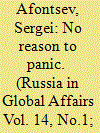

|
|
|
|
|
| Summary/Abstract |
The formation of the Trans-Pacific Partnership (TPP) has a good chance to become a turning point in the development of regional economic cooperation. Now that the first wave of both enthusiastic and angry comments on the TPP agreement has subsided, it is time to ask the main question: What is its novelty for the world economy and politics?
|
|
|
|
|
|
|
|
|
|
|
|
|
|
|
|
| 9 |
ID:
160901
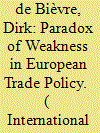

|
|
|
|
|
| Summary/Abstract |
Over the last decade, trade negotiations with Canada and the United States met with considerable resistance from non-governmental organisations (NGO). Moreover, the negotiation mandates given to the European Commission were so broad as to include topics falling under so-called mixed competence of the EU and the member states, necessitating not only ratification by the EU Council of Ministers and the European Parliament, but also member states’ parliaments. At some point, these two factors almost seemed to paralyze the EU as a trade negotiator. In the end, however, the EU concluded an agreement with Canada, renegotiated its agreement with Mexico (while also concluding agreements with Singapore and Japan amongst others), while negotiations with the US were suspended. Three factors can account for this puzzling combination of apparent incapacity and blockage and surprising resilience of EU trade policymaking. First, the NGO contestation campaigns did not muster pan‐European but rather only varying degrees of support. Second, in addition to scrutiny by the European Parliament, consensus decision-making in the Council fosters accommodation of the demands of all member states. This leads to a low degree of negotiating autonomy on the part of the European Commission, yet large bargaining power for the European Union, as long as the other side wants agreement. Finally, a recent ruling by the Court of the EU facilitated the decoupling of agreements on portfolio investment and investment arbitration (one of the most difficult hurdles), from all other matters of trade and regulatory cooperation, making it easier to reach agreement.
|
|
|
|
|
|
|
|
|
|
|
|
|
|
|
|
| 10 |
ID:
159602
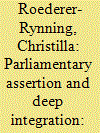

|
|
|
|
|
| Summary/Abstract |
Scholars have long viewed parliamentarians as parochial actors having little interest, or incentive to engage, in international diplomacy. Yet, parliaments have recently taken on a very active role in various international negotiations. This article explores the role of the European Parliament (EP) in the European Union (EU)–Canada Comprehensive Economic and Trade Agreement (CETA) and the EU–United States Transatlantic Trade and Investment Partnership (TTIP) negotiations. Drawing on classic institutionalist insights, it develops the concept of parliamentary assertion and explores its usefulness through a combination of comparative and process-tracing analyses. The conclusions are threefold: (1) the EP has asserted its power in international trade matters beyond the simple power of consent; (2) the EP’s search for legitimacy in the EU polity is driving this phenomenon; and (3) this phenomenon is significant beyond the current CETA and TTIP negotiations.
|
|
|
|
|
|
|
|
|
|
|
|
|
|
|
|
| 11 |
ID:
159599
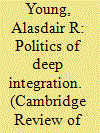

|
|
|
|
|
| Summary/Abstract |
Efforts to pursue ‘deep integration’—agreeing to international rules governing domestic policies to mitigate their adverse trade effects—have been pivotal to the politicization of trade policy. The contributions to this special issue focus on different political dynamics associated with recent high-profile efforts at deep integration. Collectively, they analyse the Transatlantic Trade and Investment Partnership (TTIP), the Comprehensive Economic and Trade Agreement (CETA), the Transpacific Partnership (TPP) and the Japan–European Union Economic Partnership Agreement (JEEPA) negotiations. The special issue, therefore, focuses on extreme examples of deep integration in order to illuminate new political dynamics. This introductory article introduces the concept of ‘deep integration’ and explores how it has been pursued in historical and contemporary trade negotiations. It also relates recent attempts at deep integration to the rise of populist anti-globalization movements. In light of these discussions, this article introduces the contributions to the issue. It concludes by considering whether the politics associated with TTIP and CETA in Europe represent the future of trade policy.
|
|
|
|
|
|
|
|
|
|
|
|
|
|
|
|
| 12 |
ID:
147916
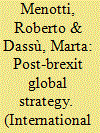

|
|
|
|
|
| Summary/Abstract |
The interview with Nathalie Tocci starts out with the Brexit issue. Here, we fundamentally agree with the argument that it would have been pointless to postpone publication of the Global Strategy. Timing may indeed be particularly relevant to PR exercises and media campaigns, but we expect much more from this particular document than just sending a set of well packaged messages to the public. The Global Strategy – even more than its 2003 predecessor – ought to become the pillar for consensus-building among the member states on a vast array of interconnected risk assessments, tasks and policies. As such, the document is a starting point and a platform for developing more detailed and sectoral policy documents. It is obvious that the Brexit vote (which, we should recall, does not constitute the UK’s instant exit from the Union) cast a new light on the whole edifice of the EU’s foreign and security policy; yet, the rationale for a comprehensive analysis of the EU’s options is clearly there, just as it was before 23 June.
|
|
|
|
|
|
|
|
|
|
|
|
|
|
|
|
| 13 |
ID:
120519
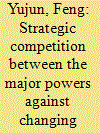

|
|
|
| 14 |
ID:
139480
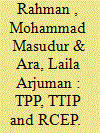

|
|
|
|
|
| Summary/Abstract |
The Transatlantic Trade and Investment Partnership (TTIP), the Trans-Pacific Partnership (TPP) and the Regional Comprehensive Economic Partnership (RCEP) could be the biggest trade deals in history. As the European Union (EU), the United States (US) and RCEP countries are the biggest trading partner of all South Asian countries, such preferential tariff arrangements could lead to a significant erosion of preferences enjoyed currently by the South Asian countries. Against this backdrop, the main objective of the present study is to investigate the potential economic impacts of tariff eliminations under TPP, TTIP and RCEP on South Asian countries using a standard computable general equilibrium model. The analysis evinces that under complete integration, in terms of tariff elimination, under these three mega deals, the excluded South Asian countries could face a tremendous negative impact on their economies. The analysis also suggests that South Asia may consider joining the TPP to minimize the negative economic impact due to arise from these mega deals.
|
|
|
|
|
|
|
|
|
|
|
|
|
|
|
|
| 15 |
ID:
126451


|
|
|
|
|
| Publication |
2013.
|
| Summary/Abstract |
The European Union and the United States are on the verge of agreeing to a transatlantic free trade agreement. The proposed Transatlantic Trade and Investment Partnership is aimed at boosting EU and US economic growth, but the negotiating partners have not excluded the defence sector from negotiations. Europe is at a tipping point regarding the rationale for its defence-industrial integration efforts. Any TTIP extending to the defence sector will raise questions about the nature of the European Defence Technological and Industrial Base, and, crucially, how it impacts the North Atlantic Treaty Organisation and the Common Security and Defence Policy.
|
|
|
|
|
|
|
|
|
|
|
|
|
|
|
|
| 16 |
ID:
153481


|
|
|
|
|
| Summary/Abstract |
The decision of the new U.S. Republican administration to give up one of the most ambitious trade and economic projects--Trans-Pacific Partnership (TPP)--signified a shift in Washington's Asian policy. For the American allies and competitors in the Asia-Pacific region this means uncertainty and new risks. Yet this may be a move intended to change the look of the policy, leaving its essence intact.
|
|
|
|
|
|
|
|
|
|
|
|
|
|
|
|
|
|
|
|
|